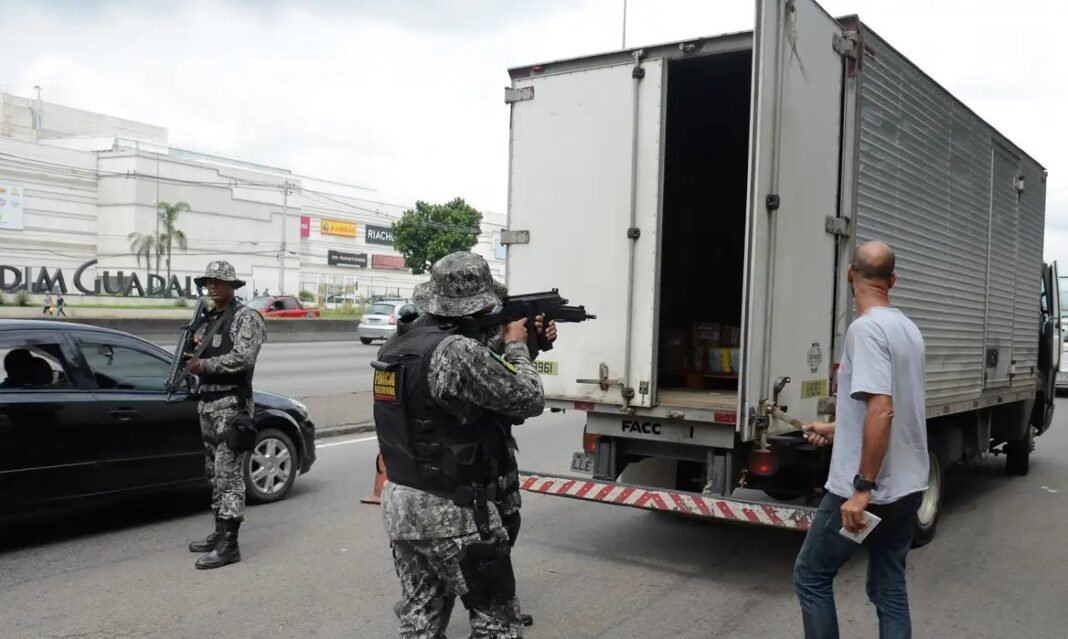In the Pedreira Complex, a favela in Rio de Janeiro’s North Zone, a stolen cargo truck carrying meat became the target of a large-scale looting by residents, despite the presence of an armored Military Police vehicle. The incident, which began on Wednesday afternoon (06/08), escalated tensions in the area, leading to police intervention and a subsequent shootout in the early hours of Thursday (07/08) involving members of the Third Pure Command (TCP). This event reflects a broader trend in the state, where cargo theft has surged significantly, with the area under the 41st Military Police Battalion experiencing a dramatic rise in cases, showing both security challenges and the economic impact on the transportation and production chain.
This Content Is Only For Subscribers
To unlock this content, subscribe to INTERLIRA Reports.
What happened
A Transporte Tozzo truck carrying Friboi meat was stolen moments earlier in Avenida Brasil, near the Pedreira Complex. Thieves forced the driver to navigate through the alleys of the favela and into the heart of the community. Once there, the criminals ordered the cardboard boxes to be removed from the truck and stacked on the ground. After releasing the truck, residents immediately attacked the merchandise and began looting it.
Commander commented on the incident.
The State Secretary of Military Police, Colonel Marcelo de Menezes, stated that officers from the 41st Military Police Battalion (Irajá) had been alerted about the robbery and attempted to contain the crowd “in a balanced manner.” Given that the primary asset to be protected was human life, the Military Police limited their containment efforts. Additional police reinforcements were deployed to enable a full occupation of the community.
Shootout
In the early hours of Thursday (07/08), intense gunfire broke out in the Pedreira Complex, in Costa Barros, Rio’s North Zone. The confrontation followed a Military Police operation to recover the stolen meat shipment, which had previously resulted in looting and confusion. According to the Military Police, members of the Third Pure Command (TCP) fired at patrolling officers during this period. Authorities clarified that there was no retaliation; the officers took cover and only left the area once the situation had stabilized. On Wednesday (06/08), Colonel Marcelo de Menezes had ordered the occupation of the Pedreira Complex after the stolen truck was driven into the favela from Avenida Brasil.
Increase in Cargo Theft
According to the Public Security Institute (ISP), cargo theft in the state of Rio de Janeiro rose by 27% in the first half of 2025 compared to the same period last year, with 1,575 reported cases versus 1,234 in 2024. The area under the 41st Military Police Battalion, which covers the Pedreira Complex, saw the most significant increase: 202 cases in the first six months of 2025 compared to 96 in 2024, a rise of 110%. The cargo stolen on Wednesday was valued at approximately R$1 million. Filipe Coelho, president of the Cargo Transportation Companies Union (Sindicarga), emphasized that such losses affect the entire production chain.
Analysis:
The incident in the Pedreira Complex illustrates the intersection of organized crime, opportunistic looting, and the challenges faced by law enforcement in densely populated urban areas. The rapid escalation—from the theft of a cargo truck to mass looting and a subsequent shootout—demonstrates how quickly criminal events can spiral in environments with limited control and high social vulnerability. The fact that residents immediately targeted the stolen goods, despite the presence of armored police vehicles, reflects both the socio-economic pressures in the favela and the difficulty of enforcing order in chaotic situations.
The broader context of rising cargo theft in Rio de Janeiro further emphasizes the systemic nature of this crime. A 27% increase in the state and a 110% spike in the 41st Battalion’s area indicate that these are not isolated incidents but part of a growing trend that affects supply chains and economic stability. The estimated R$1 million loss from this single incident illustrates the significant financial impact, while also signaling vulnerabilities in logistics security and the need for more coordinated preventative measures.




